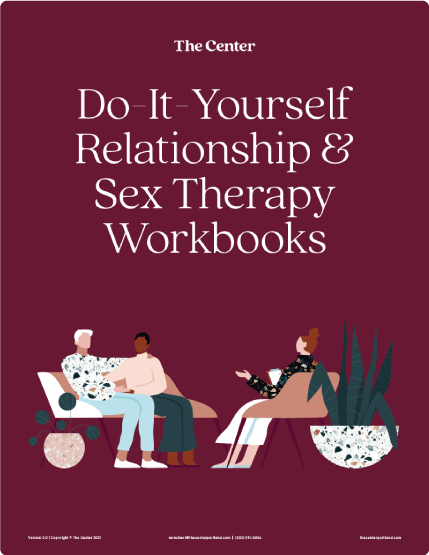Experiencing jealousy in a relationship is a common experience, but how much is healthy? First, it’s important to know that jealousy is a normal human emotion, though it can feel quite uncomfortable.
But generally, emotions—especially difficult ones—are trying to tell us something about what’s going on in our lives. It’s a sign to take a closer look.
Let’s take a look at:
- What causes jealousy
- How it can affect your relationship
- And signs of unhealthy jealousy to look out for
So Is Jealousy Ever Healthy?
Anything taken to an extreme level can be unhealthy, though a little jealousy now and again is not necessarily unhealthy.
Research suggests that jealousy is an adaptive response—meaning it’s developed in humans for an evolutionary reason1. Researchers think it exists to help us protect the relationships that are important to us.
Jealousy can indicate when we are afraid of losing an emotional and/or sexual bond with our partner to someone else. In that way, jealousy can remind us of the importance of nurturing a mutually fulfilling relationship.
This means it’s essential to prioritize your relationship to ensure everyone feels supported and has their needs met.
When jealousy strikes, it could be a wake-up call to check in with your partner about your relationship.
Ask yourself these questions:
- Have boundaries clearly been stated?
- Have you and your partner had an honest discussion on relationship expectations?
- Does your partner know what you need to feel secure?
Jealousy can also be a sign to check in with yourself!
Jealousy can stem from internal struggles like feelings of insecurity. In that case, what can you do to boost your sense of self-esteem? Have you internalized some negative self-talk? If so, you’re not alone. Struggling with self-esteem is a common issue discussed in therapy, and one a therapist can help you overcome.
What Causes Jealousy in a Relationship?
Jealousy in a relationship is most often an indication of some real or perceived threat to the relationship. You may feel worried that your partner may leave you, or that they enjoy the company of others more.
And this can be due to feeling like you’re not good enough for your partner, a lack of communication on your expectations, or a breach of trust in the past. Whatever the cause, getting to the root of the issue will help you start moving beyond jealousy.
Think about where your jealousy stems from:
- Are you struggling with trusting your partner?
- Have they betrayed your trust in the past?
- Were you lied to in a previous relationship?
- Or have you not established your needs and boundaries in the relationship?
By figuring out what’s causing your jealousy, you can then work with your partner to come up with solutions.
Signs of Unhealthy Jealousy
While a little jealousy is normal, feelings of jealousy can become destructive if you notice these signs of unhealthy jealousy.
Suspicion and lack of trust:
- Needing to be with your partner 24/7
- Paranoia about what your partner is doing when with others
Monitoring activities:
- Activities like snooping, checking texts, social posts, or web searches
- Constantly checking in on where your partner is when you’re not together
Controlling behavior:
- Not allowing your partner to do things on their own
- Putting restrictions on who your partner can spend time with
- Not letting your partner go somewhere or do something fun without you
Even if you have reasons to be suspicious, snooping or trying to control your partner will not help fix the issue. Instead, discuss your concerns around trust, and negotiate how you both can feel secure in your relationship.
Without a strong foundation of trust, it will be very difficult to move forward in your relationship.
When Jealousy Becomes Unhealthy
Jealousy becomes unhealthy when you find yourself fixated over your partner’s activities and start feeling an urge to control their actions.
Unfortunately, snooping and controlling behaviors won’t help you change what’s behind your jealousy.
If there has been a breach of trust, it can take time to recover from infidelity, but trying to control your partner won’t help heal the relationship.
If you haven’t taken the time to discuss your struggles with your partner, jealousy can potentially lead to significant disruptions in your relationship.
Jealousy and Anxiety in Relationships
Jealousy and anxiety are two commonly occurring struggles for couples. Both anxiety and jealousy can consume your thoughts and leave you in a constant state of worry about your relationship.
Now, just because you experience anxiety doesn’t mean that you’ll struggle with jealousy. Likewise, struggling with jealousy doesn’t automatically indicate an anxiety disorder. But, it can be helpful to know how they may look and feel similar.
Anxiety may lead someone to do things like constantly check in on their partner and what they’re doing. The anxiety might be linked to jealousy, or it may be rooted in worries over the other partner’s safety, or both!
Jealousy can also trigger symptoms associated with anxiety, like increased heart rate, trouble sleeping, agitation, and fear.
Signs of jealousy and anxiety can often look similar, and only a licensed mental health professional can provide a specific diagnosis. So, if your feelings of jealousy are significantly interfering with your daily life, it could be a sign to speak with a therapist.
How Does Jealousy Affect a Relationship?
Jealousy can have some significant impacts on your relationship. Snooping on your partner and monitoring their actions will make it very difficult to build a healthy, trusting relationship. Additionally, trying to control your partner’s activities may cause them to become frustrated and resentful.
Unhealthy jealousy is also often accompanied by a lack of communication. You may have boundaries, needs, and worries you need to talk to your partner about. If left unaddressed, your jealousy can put a considerable strain on your relationship.
But if you’re struggling with jealousy, know that you can overcome this and build the relationship you want.
How to Overcome Jealousy in a Relationship
Overcoming jealousy in a relationship may come with challenges, but it is absolutely possible. Here’s how to start working past it with your partner.
1. Accept Your Emotions
Fighting or pushing the feelings of jealousy won’t make them disappear. The jealousy will linger unresolved and possibly worsen over time. Remember—it’s normal to get these feelings, and by accepting them, you can start working through them.
2. Let Your Partner Know What You’re Dealing With
It can be hard to admit feelings of jealousy to your partner, but they can only help you if you let them know what’s going on. As much as we’d like, our partners can’t read our minds! Let them know if you need reassurance. Talk about what’s triggering the jealousy and that you’d like to explore solutions.
3. Negotiate Boundaries
Once you’ve identified your needs, you and your partner may need to discuss what you can both do to make sure you feel supported. This is different from trying to control your partner because you both need to come to an agreement on what boundaries make everyone feel the most comfortable.
4. Commit to Open Communication
Communication in the relationship is not a one-and-done deal. As your relationship grows, your needs and your partner’s needs may change. Keeping an open line of communication is essential to staying on the same page throughout the course of your relationship.
You can overcome jealousy before it becomes unhealthy.
Feeling jealousy is a common human experience. And it’s possible to overcome these feelings and cultivate a healthy relationship. If you’re concerned you’re veering into unhealthy territory— take some time to address where your jealousy is coming from. Then make a plan to move forward.
Whether it means working on yourself or your relationship needs, discussing your feelings with your partner will be essential to working through jealousy. And if you need some extra support, feel free to reach out today to talk to one of our therapists.







